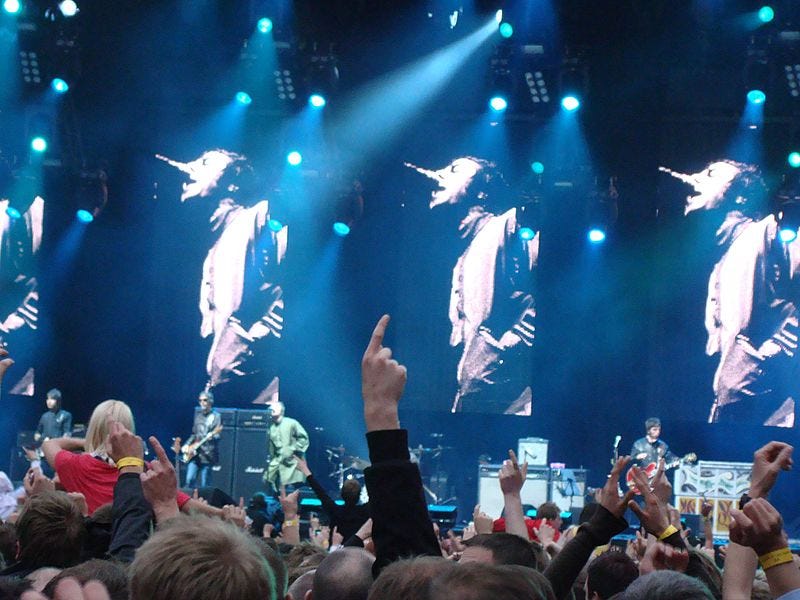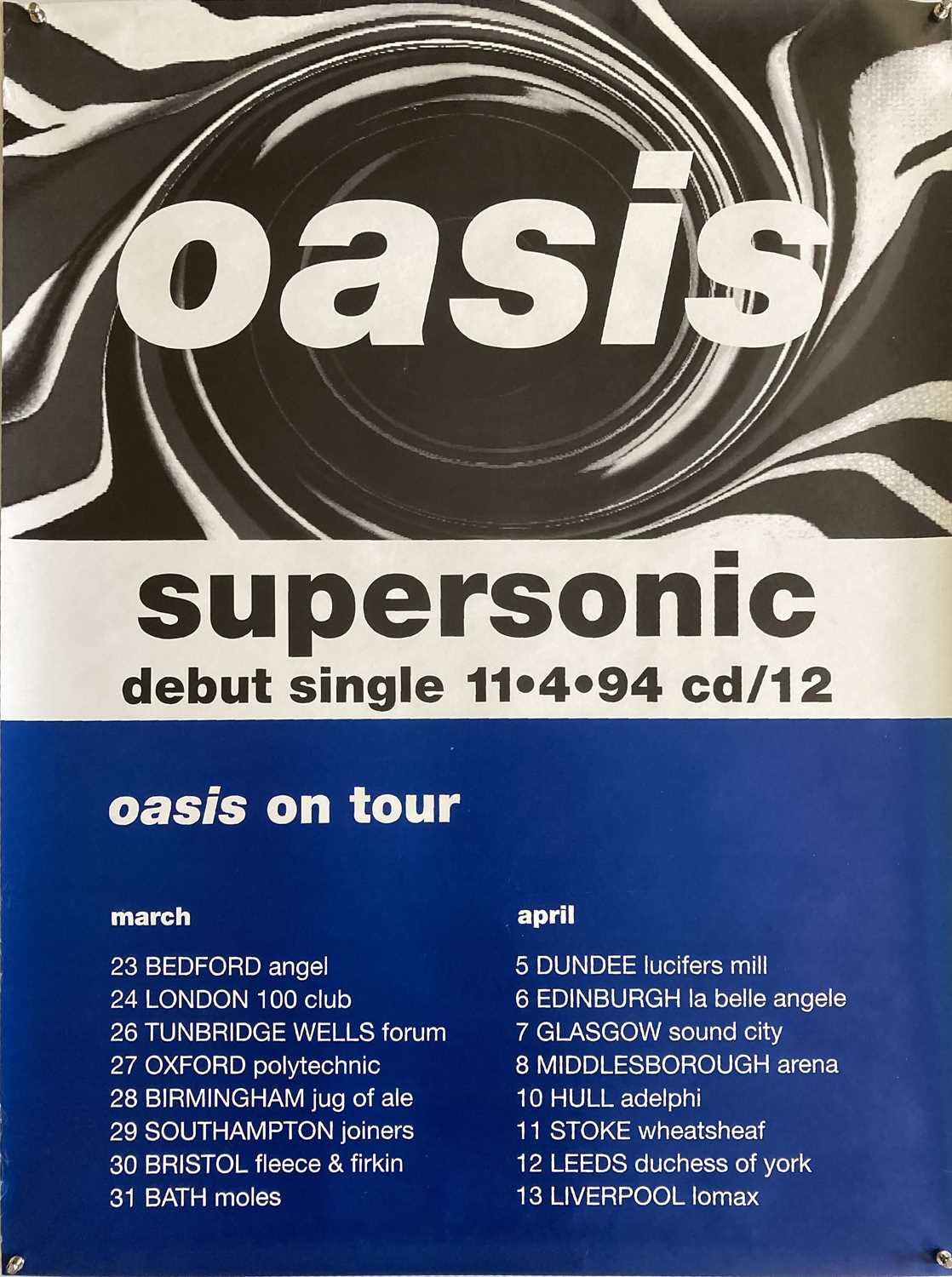
30 years ago, an up-and-coming band called Oasis played a show in my hometown of Bedford. The concert took place at the now-demolished Angel pub on Elstow Road, just a short walk away from where I lived at the time. I wasn’t at the show (because I was two), but little did I know that Oasis would play an important part in my life years later.
You might not guess it by reading this newsletter, but there was a time when I barely had any interest in music at all. Even as a teenager, I was an almost entirely “passive listener;” I would put the radio on while doing something else, occasionally dip into my parents’ CD/cassette tape collections, and sometimes stumble across something I enjoyed enough to want to hear again. But, as odd as it sounds, I don’t recall ever being moved to go out and buy a single or an album (which was the style at the time). Clearly, something was very wrong.
All that changed when I was 18, when the music video for “Don’t Look Back in Anger” randomly appeared on the TV one day. This song had been around for almost my entire life, but on this occasion, for whatever reason, it hit me. I realised that I liked this song, and felt that I had to do something with this new information.
I picked up the Oasis singles compilation Time Flies: 1994-2009 (I’d say all of this was happening in 2010-11, so the band had only recently broken up). There were a few songs on the album I remembered from my school days: “Go Let It Out,” “Little By Little,” “The Importance of Being Idle,” and, of course, “Stop Crying Your Heart Out,” the soundtrack to the England football team’s miserable exit from the 2002 World Cup.
(In a quick sidebar: the 2002 World Cup was interesting because it took place in Japan and South Korea. Due to the time difference, games were screened live in the UK around 7am, meaning we had the option of going into school early to watch matches together.)
It was good to hear those songs again, but what really grabbed me was the early material I was too young to remember hearing on the radio: “Supersonic,” “Whatever,” “Live Forever,” “Some Might Say.” There’s a magical quality to these songs that’s hard to describe – they’re positive and hopeful, and make you stand a little taller. At one time, I would literally use “Supersonic” to propel myself out of bed and out the front door in the morning.
Delving further into the Oasis discography was an interesting and rewarding experience. The albums have a lot to offer, but the real magic, I discovered, was to be found in the B-sides originally hidden away on CD singles (some of which were compiled on the 1998 album The Masterplan). Many of these are acoustic songs sung by Noel Gallagher: “Take Me Away,” “D’Yer Wanna Be a Spaceman,” “Talk Tonight,” “Half the World Away,” “Going Nowhere,” and my absolute favourite (today at least), “It’s Better People.” Noel had a talent for writing rockier songs for his brother Liam to sing, but I think this quiet, introspective material is where his true gift lies.
Some of my favourite Oasis/Noel performances come from pre-show soundchecks, where Noel would often take to the stage alone to road test new material to an audience of no one. Thankfully there were at least some people around to record these performances, but you get the sense he’s lost in his own world, playing just for himself. The song “Some Might Say,” for example, which would go on to become a huge stadium rocker sung by Liam, received its first public airing at one of these soundchecks in Tokyo in September 1994.
Similarly, a late-period Oasis soundcheck in 2009 found Noel trying out an early version of the song “If I Had a Gun,” which would emerge two years later on his first solo album.
I went to see Noel live at Wembley Arena in November 2012, when he was touring behind that solo album. My memories of the show are hazy 12 years later: I remember that he opened with the ‘90s B-Side “It’s Good to Be Free,” which seemed like a very deliberate choice at the time. He also dedicated “Whatever” to his daughter, who was in the audience, and played all the big Oasis hits that he’d sung lead vocals on, including “Don’t Look Back in Anger.” The memory that stands out the most, however, was when he played an acoustic version of “Supersonic” featuring just guitar and keyboard.
A lot of Oasis songs are like this; strip away the bombast and the volume, and you’re often left with a beautiful acoustic ballad.
I don’t listen to Oasis as much as I used to, but those songs still mean a lot to me. Few bodies of work are as sunny and optimistic as the Oasis catalogue of 1994-98, and - in uncertain times such as these - sunshine and optimism are more important than ever.
Post Script: Noel Gallagher recently appeared on That Pedal Show with hosts Daniel Steinhardt and Mick Taylor. Noel gets interviewed all the time, but it’s very rare that he gets to talk in depth about what he actually does, which is play guitar - usually he gets steered onto more headline-worthy topics.
Here, however, Noel gets to spend two hours talking about guitars, pedals and amps with two fellow enthusiasts. It’s not often you get to see someone open up like this and reveal exactly what it is that makes them tick, but skip to any point in this video and you’ll find Noel talking happily and passionately (with a lot of swearing, of course) about the thing that brings him joy in life. It’s quite something.
Post Script 2: A late addition to this post, but I just remembered a great cover of “Stop Crying Your Heart Out” from an episode of The Voice back in 2013, sung by contestant Abi Sampa. It begins conventionally, but then spins off unexpectedly into Indian classical music. I remember watching this and being horrified that none of the judges were turning around - thankfully one of them does eventually!




